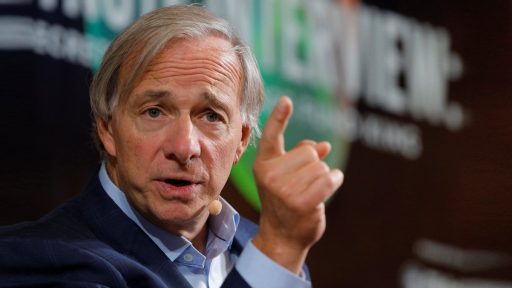- Home
- >
- Great Traders
- >
- Ray Dalio: Be bold, but not arrogant

Ray Dalio: Be bold, but not arrogant

He handed out newspapers, cleaned snow, and was a golf assistant to Richard Nixon and the Duke of Windsor.
Ray Dalio has worked in various professional fields. But he is best known for setting up and running the Bridgewater Investments fund. The most successful hedge fund in history and one of Fortune's five most important private American companies. He calls him "Steve Jobs of Investments" and is named the most influential man of Time's. Dalio is also the author of the bestselling Principles: Life and Work and his recent book Principles for Navigating Big Debt Crises.
In April, the investor and philanthropist, had a speech before the students at Stanford University.
Born in Queens, New York, with a father jazz musician, Dalio made his first investment in shares when he was 12 years old in a company that was on the brink of bankruptcy. "Another company swallowed them up and their value tripled," says Dalio. "I thought this game is easy! Well, the game is not really easy, but it definitely bets me!"
Dalio continues to invest in the years in which he is in school and then in college. Later, he joined Harvard Business School, where he studied commodities trading.
BOLDNESS, BUT NO AROGENCY
Dalio has gone through many investment firms and finally made the decision to work for himself by launching Bridgewater from his one-bedroom apartment. "An entrepreneur or investor needs to think differently," he says. "You have to be bold."
But you also have to beware of being arrogant. He understands it first-hand: In the early 1980s, Dalio predicted an economic collapse due to the bankruptcy of many states that took US loans. Such bankruptcies actually happened, like that of Mexico in 1982. Then the market just made a new bottom, never taking the negative scenario of Dalio.
He had to cut staff from the fund and borrowed money from his father to continue. "I was arrogant before," says Dalio. Failure brings him the humility that was needed to balance his audacity. In this way, he attracted people to himself who had not previously agreed with him.
IN THE NAME OF THE IDEA
But hiring people who did not always agree with him meant Dalio could think of a process to "organize" and resolve disagreements - or the cult of the idea. The Bridgewater system of prudent dissent has evolved and this has dramatically increased decision-making efficiency in the company.
"If you have a system where you can fight for your position with arguments and you know that this system will still be fair, it will motivate you even more," says Dalio. "This is the competitive advantage in this case."
This ideology stands out over the fundamentals of radical truth and radical transparency. "There are two aspects of your self," says Dalio. "A consciousness that is reasonable enough to look at their weaknesses and deal with them." The emotional self is the other aspect that will make it much harder for you. "
Radical transparency means that everyone is willing to share their ideas with which to make a decision. While radical truth allows people to share how they really feel and thus challenge others to the same openness. This brings people together not only as colleagues, but also as individuals, conscious, and intelligent thinking and sharing beings.
TAKE THE EXPERIENCE
"Act for Experience," Dalio's advice to Stanford students about career choices.
"Find three or four of the smartest people who work on the most important questions that stand before you, where you do not agree with them, you will experience and learn a lot."
Dalio believes that choosing the right organization and reduced to culture: "It is much more important when you are and where you are than what you are doing Go to work and ask yourself the question: If something is wrong for me, am I right to ask why it makes no sense, and at the same time ask, after all, why does it make sense? "
LEARN FROM HISTORY
Part of Dalio and Bridgewater's success lies in applying lessons from history to reality. "There is a cause-and-effect relationship as it is repeated in history." Studying this phenomenon, Dalio looks at the story of the Great Depression. This helps him to anticipate successfully the financial crisis of 2008.
Now he has made a wider analogy with today and the times of the 1930s. "Again, we have a great gap between rich and poor and rising populism, and in 1930 we have seen the rise of a great force that provokes another, and then Germany stands up and puts the British Empire to the test, and we are watching the rise of China. We have definitely been targeting conflicts, but quite different in nature, and the question is, how will we deal with these conflicts? "
FOLLOW THE PRINCIPLES
Dalio proposes a policy-based approach to addressing local and global issues: "Are we aware of what principles connect us as a nation and a world, what do we believe in? What are the principles that separate us?"
He points out that those in the top 40% of the US economy spend five times more on the education of their children than the other 60% who are at the bottom. This reflects in a dramatic way and creates a prerequisite for inequality. And this is a result that we would not want.
Dalio recommends a dual approach that is fed by disagreement - working on issues like unequal training with precise and clear principles. "If we do not do it together, we'll go deep."
 Trader Martin Nikolov
Trader Martin Nikolov Read more:
If you think, we can improve that section,
please comment. Your oppinion is imortant for us.











